For as long as I can remember, Final Fantasy VI has been heralded as “the secret actual best entry” in the Final Fantasy canon. If so many people keep saying it, how secretive can it be? If a million fans whisper a certain sentiment, that whisper becomes a scream. At this point, in 2022, I think it’s fair to start this review by saying that a lot of people think so highly of it, and there’s no amount of quietness behind their proclamation.
Do I think Final Fantasy VI is the reigning chocobo champion? Honestly, not really. It’s a great game and a seminal moment in Square’s history. It gets a lot of things right, but there are wrinkles in its battle and customization systems that don’t really wow me. That said, it’s likely my favorite of the 2D-era entries. So, while you won’t necessarily see me heaping quite as much praise upon the original release as you will in other reviews, bear in mind that FFVI is still quite special to me and the ultimate case study in whether the Pixel Remaster series would get things “right” or leave me with a disappointing aftertaste.
The last chapter in the return to two dimensions, with one of the largest built-in fandoms in RPG history, Final Fantasy VI Pixel Remaster graces PC and mobile gaming enthusiasts with a long-awaited return to the steampunk land of greedy humans and noble Espers, grunting yetis and a partnered pair named Bonnie and Clyde. Co-starring a gal who seeks a sense of love and a lady whose powerful magical abilities are essentially the result of petri dish politics, Final Fantasy VI has always worn its heart on its sleeve.
And yet the game summons some truly startling moments within the context of its loud premise — a certain attempted suicide for one, though I’ve always been most impressed by the rigors of a former knight who feigns the role of a dead man to write letters to a grieving woman.
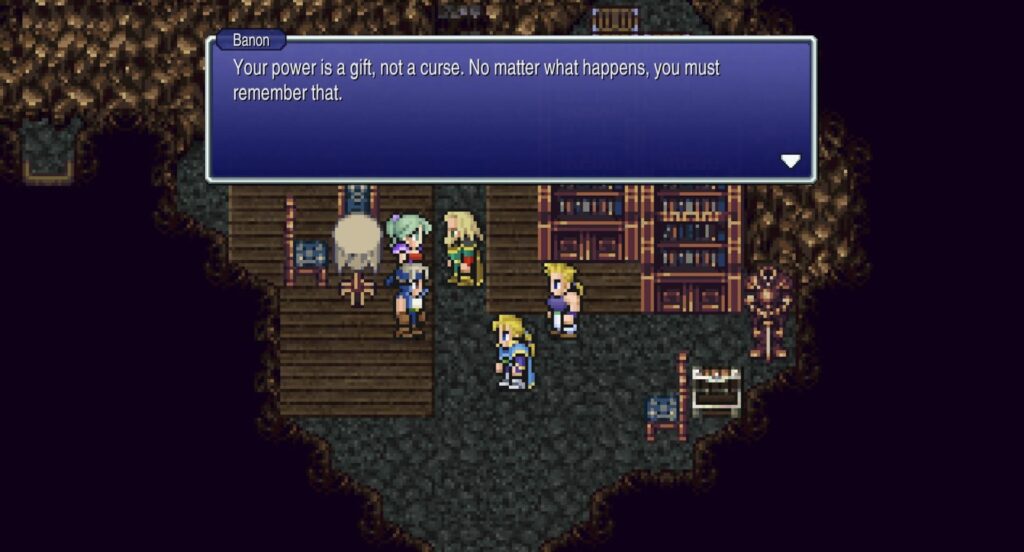
It’s these moments, I should think, that shocked people in 1994 and still zap them today. In Japan, the Final Fantasy series had just launched Final Fantasy V, a much more straightforward high-adventure swords-and-sorcery affair, so sequences like the famed opera performance (more on that later) must have felt almost alien by comparison. In the West, FFV skipped our shores, but even when compared to the Saturday morning cartoon vibe of Final Fantasy IV‘s relatively serious premise, FFVI jumps off the page with gut-punching emotional moments one might not expect from a game that, just 20 minutes in, tasks the player with controlling three separate parties made up almost purely of little white sentient teddy bears to protect an unconscious damsel in distress.
With a soundtrack by legendary composer Nobuo Uematsu that is fully equipped to drive those melancholy moments home and a somewhat more muted pallet than its predecessors, FFVI set out to distinguish itself from the rest of the pack — and succeeded. Indeed, there is ample reason for the complaints echoed by many fans when the 2007 Game Boy Advance re-release, Final Fantasy VI Advance, bowed to the apparent constraints of the hardware by giving the world a washed-out look and damaging the music quality with a “fuzzier” recreation.
Part of the promise behind the Pixel Remaster project was the delivery of a “perfect” representation of these games’ appearance. A look that blends authenticity with modern capabilities, allowing the vintage style to shine like never before. In this regard, the results have been mixed. Final Fantasy III‘s graphical touches are perhaps the best of the bunch, a terrific upgrade that maintains the original feel.
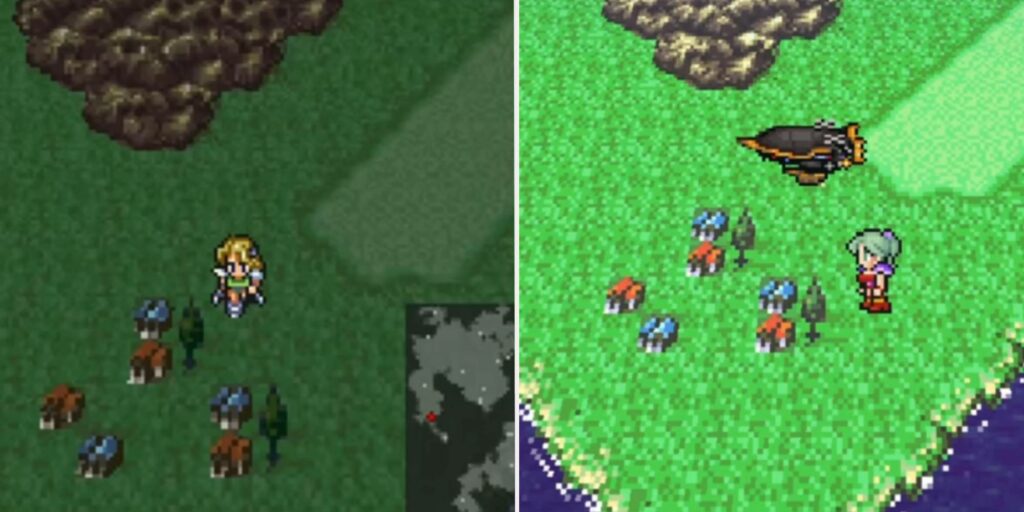
In Final Fantasy VI Pixel Remaster, things have gotten… weird. I’m not quite sure what compelled the designers to do this, but certain colors pop to such an extent now that aspects of the game’s atmosphere are left behind. The best example of this is the overworld’s grassy fields; whereas previously, they were a few shades duller to help sell the more natural (and less fanciful) development philosophy, here they’re as lime-green as Mountain Dew. And gamers the world over know nothing screams “extra!” quite like Mountain Dew.
It’s an oddity and the polar opposite dilemma that Final Fantasy VI Advance had faced. Whereas that one went too muted to the point of losing its character, this rendition seems to beg players of the previous Pixel Remasters not to run: “Don’t worry, FFVI is just as vibrant, just as goofy, please keep playing, Mountain Dew is gamer fuel, I love you.”
For those of us who can get past the funky-looking overworld revamp, however, most of the game’s other updates are appreciated. The majority of the main cast’s sprites are positively darling, with the sole potential exception to Terra’s; the extreme brightness of her green hair, while there’s nothing objectively wrong with it, just doesn’t gel at all with classic depictions. It sticks out like a sore green thumb, but one calming look at the delightful detail given to Locke’s vest, Edgar’s coat, Umaro’s… fur? And it’s easy enough to forgive.
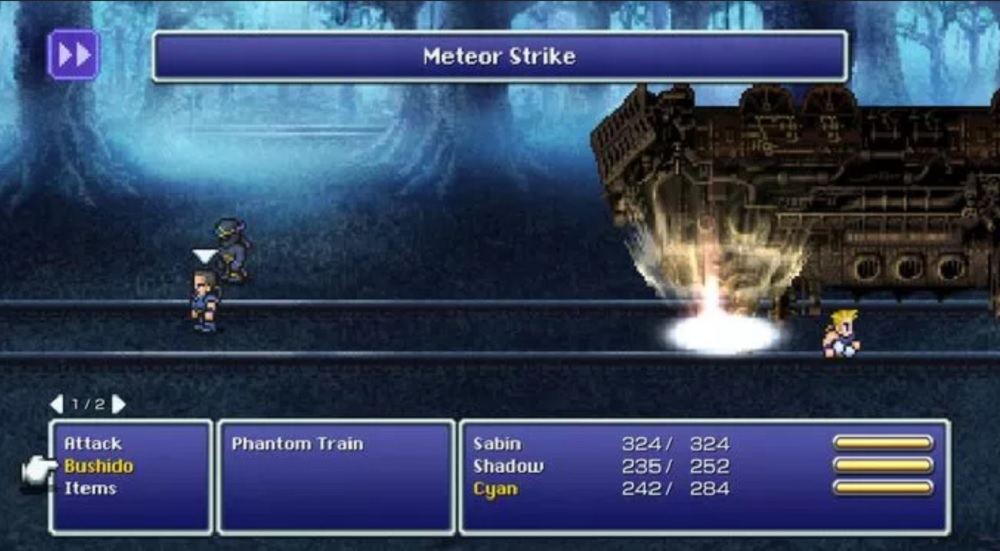
Much was made of the “Octopath Traveler scenes” Square advertised in the game’s marketing campaign. What this really means is that, inspired by the wonderful work put into their 2D-HD engine seen not only in Octopath Traveler but recent (and fantastic) Triangle Strategy and a few future projects, a handful of scenes in FFVI have added a similarly gorgeous look. Don’t expect to see this often. But when it does pop up, it’s just as good as it should be, a sudden “oh!” that echoes the old-school PlayStation bits where suddenly our breath is taken away by CG. Okay, maybe not quite to that degree. But still, good times.
The other big promise that Square Enix established with the announcement of the Pixel Remasters, and probably the more exciting bit, are reorchestrated soundtracks supervised by Uematsu himself. (It’s important to note that these are supervised, not solely helmed, by him; the media has frequently misrepresented the situation and left off all mention of the fact that it’s a team of talented younger composers who have handled the bulk of the work.)
For the most part, the fans have decided that these fresh versions are a resounding success. From what I’ve been able to tell, all three NES games are nigh-universally embraced in this regard, and Final Fantasy V‘s as well. Final Fantasy IV, perhaps a bit less so; most of these newer tracks are celebrated, but a few, like the boss battle theme, maybe not so much.
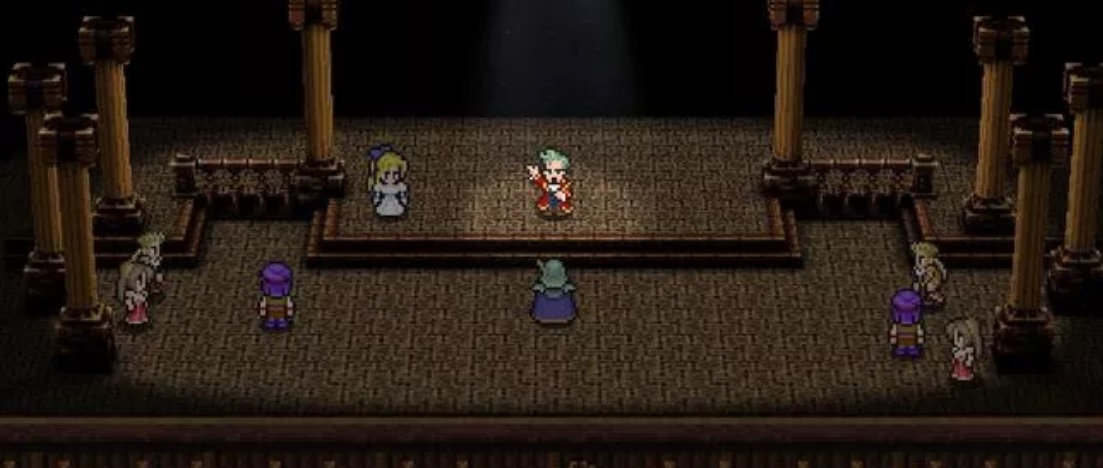
Where does FFVI stand? Tall. Quite tall. Tall enough to make up for the Dew and then some. Holy mackerel, this is Pixel Remaster at its finest. Every single song in Final Fantasy VI Pixel Remaster is immaculate. Special attention must be granted to the opera. These are real singers taking the source material and not suffering any major form of compression. It’s all silky-smooth. Are you a longtime franchise fan who recalls the stunning quality of “Waltz for the Moon” during Final Fantasy VIII‘s dance sequence? Because that’s how this thirty-something yours truly felt here. Chills down the spine in all the right ways.
But don’t let all the buzz around Celes’ singing distract you from the rest of the package. The World of Balance’s theme, “Terra”, has never sounded better. And I speak as someone who used to carry around an honest-to-god CD player with a disc filled to bursting with OCRemix variations on that song. The often-overlooked theme that plays early into the World of Ruin, “Dark World”, is more dread-inspiring than ever, and its far more renowned successor track, “Searching for Friends”, is certain to amaze.
Speaking of the World of Ruin, however, this brings us to the sixth and final edition of Nova Crystallis’ classic “that said, things are missing” paragraph. Not that anyone should have expected otherwise after not one, not two, but four previous examples of it (FFIII wasn’t part of the equation), but yes, the bonus content originally added in Final Fantasy VI Advance (also known as the reason why despite my earlier jabs at it, it’s still great) and carried into the unspeakably ugly 2014 mobile versions has not been brought into Pixel Remaster‘s unified new engine.
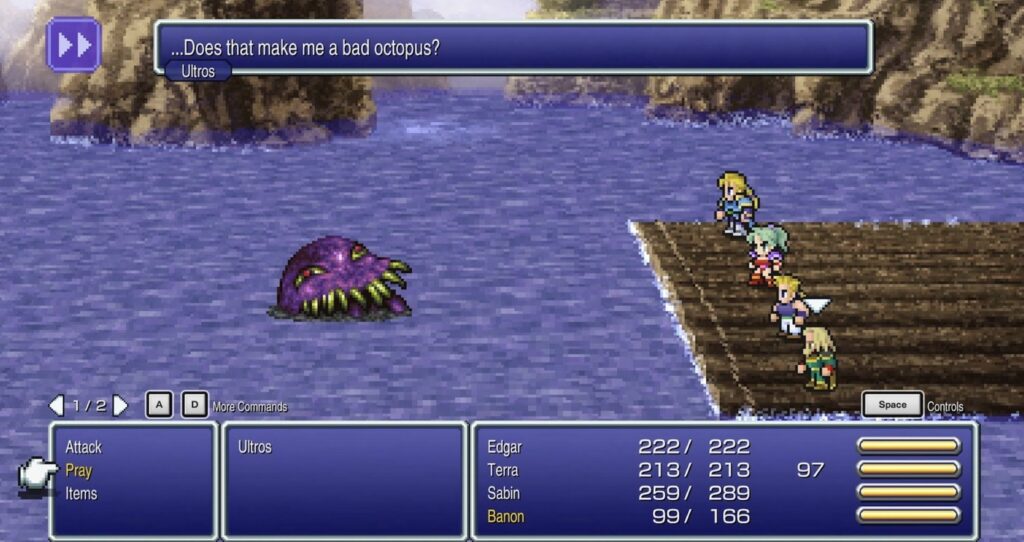
In some instances, this sad omission is more depressing than others. Opinions will differ, but I felt no stinging tears in my eyes at the lack of, say, Final Fantasy‘s considerable number of bonus dungeons. It’s neat that, between them all, the game’s clock time is much higher than the original ten or so hours. But that breeziness, at the end of the day, is rather part of the charm. It’s a classic tale that starts, develops, and finishes with a minimal flourish, its themes and tropes expanded upon full-force in later entries. On the other side of the coin, Final Fantasy V‘s extra dungeon and especially its new Job Classes? Losing those is a real bummer.
I’d say the lack of 2007-2014 embellishments here in VI is closer to the latter, unfortunately. This game has always been, at least in my book, the easiest of the pre-VII installments and frankly, even easier than much of what came after. It’s a quibble I’ve had since the beginning; unless you’re underleveled, bosses seem to drop like bowling pins until the final dungeon, when things get a bit tougher. Hence, the postgame dungeon called the Dragon’s Den was a shining beacon to me, a place to truly test out the overbearingly overpowered skills and equipment that are all too easy to acquire. Having that gone, and saying farewell to the added Espers Leviathan, Gilgamesh, Cactuar (!), and Diabolos, kind of sucks.
Here’s something happier — Cyan’s Bushido bar doesn’t suck. Credit where credit’s due: this was fixed in the otherwise-banal older mobile outings I’ve previously mentioned. (They even crept their insidious claws around Steam’s storefront eventually. Truly deplorable. Anyway.) But for those of us who would prefer to play a good version of FFVI with the sweet bonus that Cyan is no longer near-objectively the worst character to use in battle because his special ability is slaughtered by the amount of in-combat time it takes to wait for the meter to reach the good stuff? Behold, Pixel Remaster. I’ve always loved Cyan and I hated that he got a raw deal. Stubbornly, I’d use him anyway. I mean, why not, when I can just equip the Offering and Genji Glove to someone at the end of the game and kill Kefka in one turn? But I never used his Bushido, which rather defeats the whole point of it.
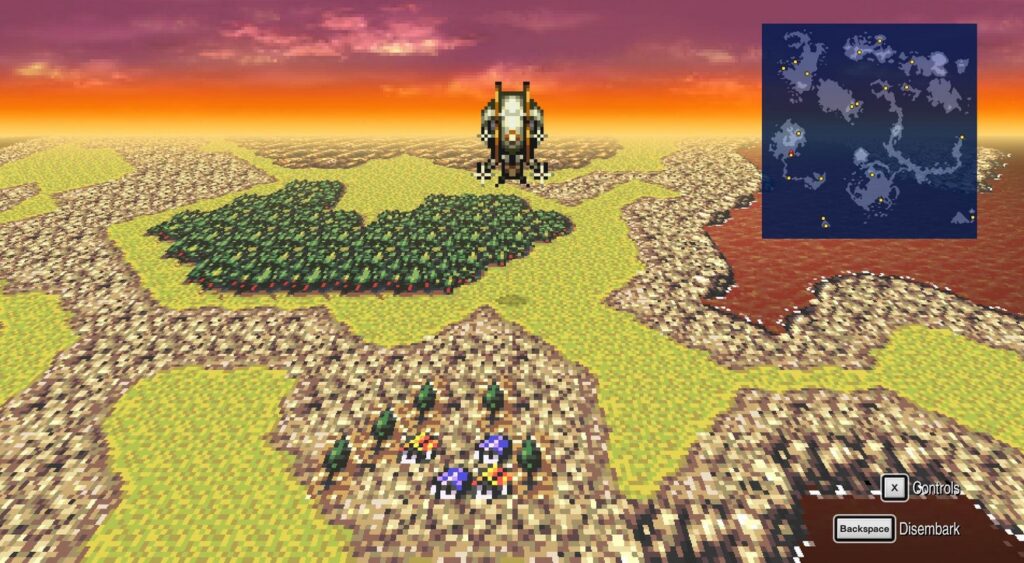
As you can see, I’ve bumbled back and forth considerably on the peaks and valleys. I ought to clarify here that the positives far outweigh the negatives. Pound for submerging castle pound, this is one of the best ways to play one of the finest role-playing games around. But that’s always the stickler, isn’t it? The asterisk, the tiny little text at the bottom of the emphysema medicine commercial. Like most of its predecessors in the Pixel Remaster era, it’s one of the best ways. Most reviewers, myself included, cannot call it the best. Not when certain content is missing from prior outings, nor when some of the graphical decisions are baffling. And to those who will inevitably point out that grieving over a lack of content that wasn’t in the SNES original is unfair, look, let me spell out my opinion here in no uncertain terms: I like the versions with that stuff more because of its inclusion.
The sun now sets on Pixel Remaster, barring, hopefully, console editions later on. Looking back, I’m quite glad these exist. In the realm of the overall, I’d label them near-definitive. In the case of FFVI, I’m not quite as sold, but I will say this much. Anyone who has ever gotten a bit misty-eyed at the strength of this game’s music owes it to themselves to replay the Returners’ excellent story with the bells and whistles — and sensational opera vocals — available today. Going back to the still-fantastic classic music will be a difficult endeavor for me, and on that count alone I cannot conceivably tell anyone interested in picking this up to refrain.
Other counts are mixed, but ultimately favorable. For all of you whose whispers became a scream, a mantra that Final Fantasy VI is the unequivocal master of the video game domain, click purchase already, will ya? To the rest of us, the admirers with reservations, it’s still worth the price. Just do be sure to grab some Doritos to go with all that Dew.
No, I can’t get over it.
Recent Comments